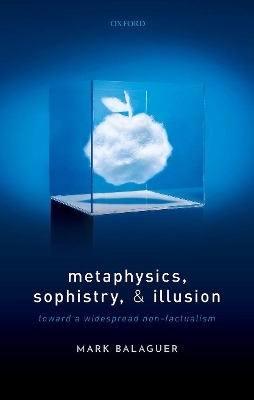
Metaphysics, Sophistry, and Illusion
Oxford University Press (Verlag)
978-0-19-886836-1 (ISBN)
Metaphysics, Sophistry, and Illusion does two things. First, it introduces a novel kind of non-factualist view, and argues that we should endorse views of this kind in connection with a wide class of metaphysical questions, most notably, the abstract-object question and the composite-object question. (More specifically, Mark Balaguer argues that there's no fact of the matter whether there are any such things as abstract objects or composite objects--or material objects of any other kind.) Second, Metaphysics, Sophistry, and Illusion explains how these non-factualist views fit into a general anti-metaphysical view called neo-positivism, and explains how we could argue that neo-positivism is true. Neo-positivism is the view that every metaphysical question decomposes into some subquestions--call them Q1, Q2, Q3, etc.--such that, for each of these subquestions, one of the following three anti-metaphysical views is true of it: non-factualism, or scientism, or metaphysically innocent modal-truth-ism. These three views can be defined (very roughly) as follows: non-factualism about a question Q is the view that there's no fact of the matter about the answer to Q. Scientism about Q is the view that Q is an ordinary empirical-scientific question about some contingent aspect of physical reality, and Q can't be settled with an a priori philosophical argument. And metaphysically innocent modal-truth-ism about Q is the view that Q asks about the truth value of a modal sentence that's metaphysically innocent in the sense that it doesn't say anything about reality and, if it's true, isn't made true by reality
Mark Balaguer received a BA in Philosophy and Mathematics from the University of Colorado at Boulder, and a PhD in Philosophy from the City University of New York Graduate Center. He is the author of Platonism and Anti-Platonism in Mathematics (Oxford University Press, 1998), Free Will as an Open Scientific Problem (MIT Press, 2010), and Free Will (MIT Press, 2014), as well as numerous journal articles on a wide range of philosophical topics.
1: Introduction
Part I: Non-Factualism
2: Against Trivialism and Mere-Verbalism (And Toward a Better Understanding of the Kind of Non-Factualism Argued for in This Book)
3: How To Be a Fictionalist About Numbers and Tables and Just About Anything Else
4: Non-Factualism About Composite Objects (Or Why There's No Fact Of The Matter Whether Any Material Objects Exists)
5: Non-Factualism About Abstract Objects
6: Modal Nothingism
Part II: Neo-Positivism
7: What is Neo-Positivism and How Could We Argue For It?
8: Conceptual Analysis
9: Widespread Non-Factualism
10: A Worldview
| Erscheinungsdatum | 06.04.2021 |
|---|---|
| Verlagsort | Oxford |
| Sprache | englisch |
| Maße | 164 x 21 mm |
| Gewicht | 1 g |
| Themenwelt | Geisteswissenschaften ► Philosophie ► Erkenntnistheorie / Wissenschaftstheorie |
| Geisteswissenschaften ► Philosophie ► Logik | |
| Geisteswissenschaften ► Philosophie ► Metaphysik / Ontologie | |
| ISBN-10 | 0-19-886836-7 / 0198868367 |
| ISBN-13 | 978-0-19-886836-1 / 9780198868361 |
| Zustand | Neuware |
| Informationen gemäß Produktsicherheitsverordnung (GPSR) | |
| Haben Sie eine Frage zum Produkt? |
aus dem Bereich

![Was heißt Denken?. Vorlesung Wintersemester 1951/52. [Was bedeutet das alles?] - Martin Heidegger](/media/113619842)
